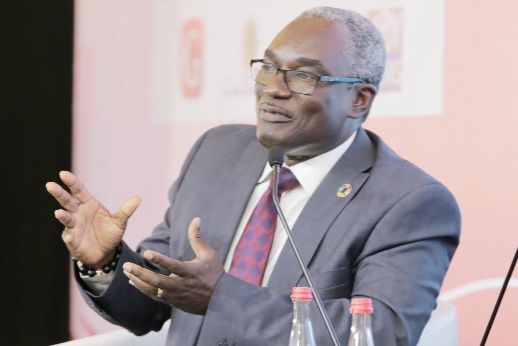The Director-General of the National Development Planning Commission (NDPC), Dr. Kodjo Mensah-Abrampa, has said that the nation is aggressively changing its economic architecture to ensure sustainable growth.
According to him, there is currently a concerted effort geared at moving away from the export of raw materials to adding value; and the NDPC, mindful of this, is influencing current and future policy guidelines toward achieving the goal.
Speaking to the B&FT in an interview on the nation’s medium-term development plan, Dr. Mensah–Abrampa said many of the economic challenges the country is facing can be narrowed down to practices which gained root due to lack of the right enabling environment. However, he said, the economic management team has resolved to reset the economic infrastructure by taking advantage of effects from the COVID-19 pandemic.
“We have had a situation where Ghana has given a different explanation to economic theories. One of the prudent and well-accepted theories is that you move from primary stages (getting raw material) to manufacturing, industrial development, and then services in terms of the economy’s structure.
“Ghana has from the primary stage jumped all the other significant stages to services. With this, we have significantly reduced the contribution of agriculture and raw materials to our Gross Domestic Products (GDP).
Over the years, our economy has produced raw material and exported; giving the raw material to other manufacturing firms abroad. With this, we are servicing their industries, and that has been our bane,” Dr. Mensah-Abrampa explained.
He noted that, with the advent of COVID-19, the economic management team realised that the opportunity is present to reset the economy in an accelerated manner to leapfrog the nation’s fortunes.
“What we have been doing is that, now that COVID-19 has put all economies down, Ghana is strongly developing the agro-processing sector to link up with agriculture, and we believe this will give the nation a sustainable structure.
“With this, the services sector can respond to agriculture as well as industry, and that is where we will get a huge projection in our economic pursuit,” he said.
He added that efforts are being made toward adding value to all the mineral raw material of the country, as this will redefine the economy.
“The news of Ghana Integrated Aluminium Development Corporation (GIADEC), the gold refinery, 1D1F and some others are all coordinated. GIADEC will be utilising the large bauxite deposit to ensure there is enough aluminum to feed industries like the car manufacturing plants which have been attracted to come here.
“The large iron deposits in the country will also be taken advantage of; they will not be mined and exported but given to manufacturing companies established in the country.”
He said that the backbone to achieve all the above is energy; and as a result, the nation is working not only to ensure reliable power but also generate it at a low price.
“We know that we are currently consuming about 4,000 megawatts and we have the capacity to produce about 5,000 plus; but this projection can take us only as far as 2023; we are putting up plans to ensure beyond that we can meet the energy needs of the country to spur industrialisation.
“Even beyond 2023, there are plans of adding nuclear to the energy mix. It is a long-term energy security plan,” Dr. Mensah–Abrampa said.










